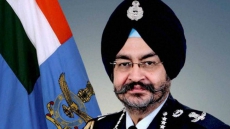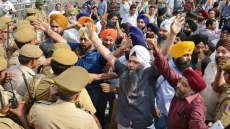As the country gears up to observe the 100th anniversary of the Jallianwala Bagh massacre of innocent, unarmed Indians by ruthless British forces, the events before and after the April 13, 1919, killing of hundreds clearly indicate that the British rulers of that time were unnerved by the unrest in Punjab in general and Amritsar in particular, which led them to do something which could "teach a lesson" to the Indians.
"Though Brigadier General Reginald Dyer (who ordered his troops to fire on people who had gathered at the Jallianwala Bagh on the fateful day and killed hundreds) was blamed for the action, there is hardly any documented evidence to show how he landed in Amritsar on that day as he was posted in Jalandhar (earlier Jullundur)," author and columnist Kishwar Desai told IANS in an interview here.
Desai, who has penned a book "Jallianwala Bagh, 1919: The Real Story" recently, said that her extensive research on the happenings around the massacre revealed that the British rulers were quite unnerved by the unrest in Punjab and Amritsar.
"Prior to the killings at Jallianwala Bagh, there had been signs of increasing unrest in Punjab. These signs were being interpreted as sedition, even though causes of the unrest were varied.
Indeed, it is impossible to understand what happened on 13 April 1919, without an examination of the barbarism unleashed in Punjab under the regime of the then Lieutenant Governor Sir Michael O'Dwyer to suppress the so-called rebellion," Desai, who is the chair of The Arts and Cultural Heritage Trust that set up the world's first Partition Museum at Amritsar's Town Hall, points out in her book.
The author said that the idea to write this book and to bring out "some facets which had not been researched in detail so far" came after she chanced upon a photograph of the burnt-down Town Hall building of Amritsar. This happened in April 1919.
Further investigation and research, according to Desai, led to more evidence of the British atrocities on Indian subjects just before the Jallianwala Bagh incident and the violence that erupted in Amritsar on April 10 in which many people, including five Europeans, were killed. Properties, including the Town Hall, were targeted to protest against the British atrocities.
Disputing the commonly held narrative that the people who had gathered at the Bagh on the fateful day for an anti-Rowlatt Act meeting were outsiders who had come to Amritsar for the Baisakhi festival, Desai points out that the meeting was attended mostly by local residents of Amritsar and no more than 25 per cent of them were from outside.
"And it is very likely that the massacre was a carefully planned one, not spontaneous one as has been often made out. In all likelihood, no women were present," Desai states in the book, adding that O'Dwyer, who was nearing retirement at that time, and others in power, were upset over the emerging importance of Punjab in the freedom struggle and retaliated with a reign of terror where people were whipped in public, bombed, incarcerated, forced to crawl, starved, beaten, caged and even executed.
"The massacre on 13 April was part of a policy of oppression unleashed by O'Dwyer against the frequent 'hartals' (strikes) or the 'Satyagraha Movement' (launched by Mohandas Karamchand Gandhi)... in fact, the civil administration of Punjab had already declared Amritsar a war zone (around April 11) and regarded the residents as their enemies," Desai points out in the book.
Dyer, who had arrived in Amritsar from Jullundur on the evening of April 11, had ordered his troops to fire on the gathering inside Jallianwala Bagh on the evening of April 13, 1919. The official death figure was put at 379 while nearly 1,200 were injured. The death toll is often disputed, with claims (Indian National Congress Report) that over 1,000 innocent people were killed.
"Not a very well-known entity" when he arrived in Amritsar, Dyer had a "fairly humdrum career" till he "hit immortality as a mass murderer", the new book says.


